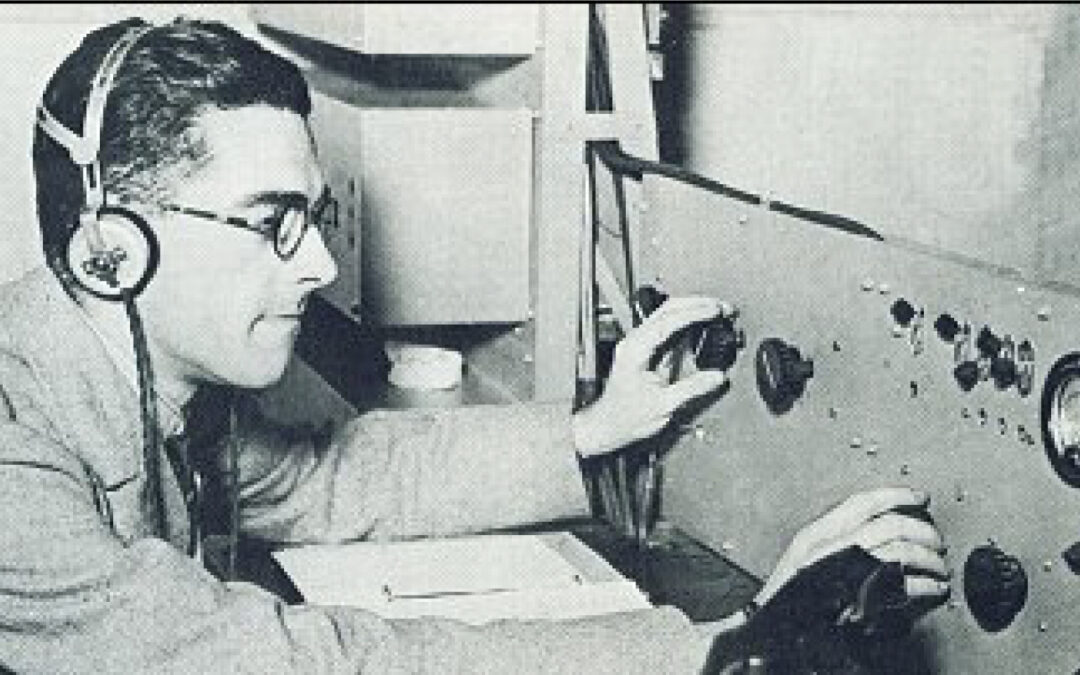In this week’s #ForgottenFriday, we are focusing on the celebration of a century; 100 years of the BBC.
We are going to be looking at the BBC during the Second World War and how important broadcasting and communication was for morale and families knowing where their loved ones were.
October 1922: The start of it all!
The British Broadcasting Company, as the BBC was originally called, was formed on 18th October 1922 by a group of leading wireless manufacturers including Marconi.
Daily broadcasting by the BBC began in Marconi’s London studio, 2LO, in the Strand, on November 14, 1922. John Reith, a 33-year-old Scottish engineer, was appointed General Manager of the BBC at the end of 1922. There was much controversy regarding the BBC and its future, however, in January 1927, the BBC was fully established by Royal Charter as the British Broadcasting Corporation. Sir John Reith became the first Director-General. The Charter defined the BBC’s objectives, powers, and obligations. It is mainly concerned with broad issues of policy, while the Director-General and senior staff are responsible for detailed fulfilment of that policy.
As the BBC outgrew their studios at Savoy Hill, the organisation had to find a new home, and on 14th May 1932, the Broadcasting House opened. Instead of converting another existing building, the BBC commissioned a purpose-built centre; at the time it was one of only two in Europe. Leading modernist designers were employed, and the building is a mixture of functionalist and art deco styles.
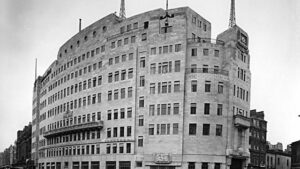
BBC Broadcasting House, May 1932
The BBC in the Second World War
The BBC at war saw fundamental changes in programme-making practice, live reporting from battle scenes, and was a primary source of propaganda news to the free world.
In Britain, during the first weeks of the Second World War, public entertainment venues closed down. The blackout darkened the streets, and people stuck at home turned to radio as never before. They were seeking news but also diversion — a difficult balance for the BBC to achieve. Many hated what they heard. But the BBC had a seemingly unlikely star: Canadian-born Sandy Macpherson, the BBC’s resident theatre organist.
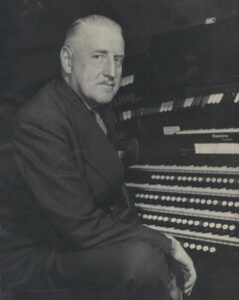
Sandy McPherson with organ
In January 1942, BBC devised Desert Island Discs, recorded with Roy Plomley, and Vic Oliver in the bomb-damaged Maida Vale Studios. The success of the programme has always owed much to its simple format, which allows for sometimes revealing interviews. However, early programmes were scripted, to comply with wartime censorship.
After Britain declared war on Germany on 1st September 1939, the BBC, like the rest of the country, was in emergency mode. It sent its music and entertainment departments outside of London and had to get government clearance for any non-staff entertainers. It shut down its nascent television service and reduced radio to a single wavelength.
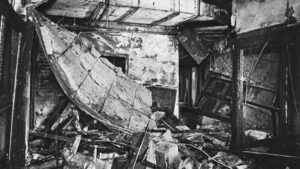
BBC Broadcasting House after bombing in 1940
Throughout the Second World War, there were many times the BBC was a target from the Luftwaffe. It was in October 1940, that the BBC’s iconic headquarters, Broadcasting House in London, suffered two direct hits in the Blitz, causing widespread damage, several deaths, and many injuries. It was a stark reminder that the BBC was high on the list of enemy targets. It also showed that broadcasters, like the rest of the British population, were experiencing first-hand the horrors of war on the Home Front.
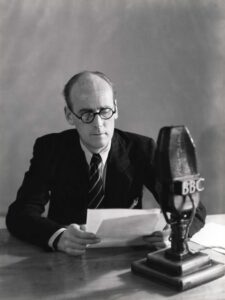
BBC Broadcaster Bruce Belfrage recreating the infamous scene in the Blitz
The most famous story of the devastating bomb which landed on Broadcasting House on the night of Tuesday 15 October 1940, was that it was heard live on air by millions of listeners who had tuned-in for the 21.00 news, read that evening by Bruce Belfrage sitting in a basement studio of the building.
Over the last 100 years the BBC have announced many historical events to the British Public throughout the 20th & 21st Century.

